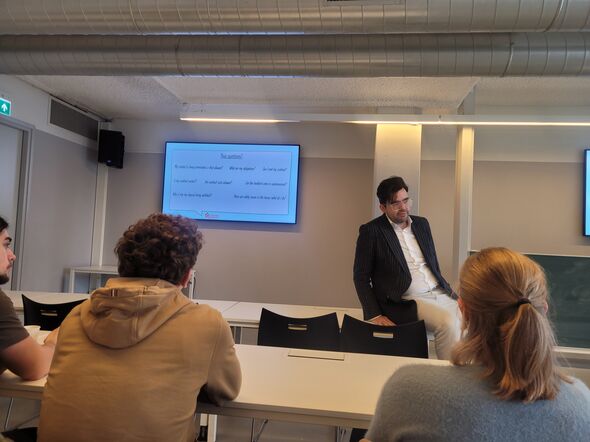Students ask questions about tenant rights
What to do if your landlord doesn't take action if you have a moldy bathroom or a power outage? What are your exact rights as a tenant and what’s the best way to tackle problems with landlords? These questions were discussed in a recent live session on tenant rights on the TU/e campus, organized by Huurteam Eindhoven and student party DAS.
“Many students aren’t all that familiar with their rights, which makes them vulnerable to unfair practices,” says Thijs Schoenmakers of student party DAS. “Examples include unjustified rent increases and poor maintenance. This session was meant to give students more knowledge and practical tools.”
The information session, which was held at the Luna building last week, was led by Rick Blezer of Huurteam Eindhoven, an advice center of Eindhoven Municipality that supports tenants. Although students are an important target group, all residents of Eindhoven are welcome to contact the center, whose services are fee.
Maintenance and rental price
A recurring problem mentioned by Blezer is correctness of the rental price. This is why Huurteam Eindhoven offers tenants a ‘rental price check’, a service to assess whether the rent they’re paying is reasonable. Blezer emphasizes that as of July 2024, landlords must calculate a separate price per room and provide individual contracts for three or more separate households in a home. This turns out to be important in various situations discussed in the session.
Maintenance problems are very common too, such as with two students who haven’t had electricity in part of their house for nine months already. In the session, they describe their problem to Blezer: “Our landlord has hardly responded to our requests for months.”
Blezer says that electricity is a necessity and points out various ways of solving this problem to the students. “You could consider suspending part of the rent, provided you support this with good arguments,” he advises. “If you go about it in the right way, it will be very difficult for the landlord to challenge the suspension.”
Summary proceedings or administrative fine
Another option is to file summary proceedings against the landlord. If they wish to go down this route, students are generally assigned a lawyer free of charge. But they can also decide to have the necessary repairs carried out themselves and then recover the costs from the landlord. In that case, Blezer advises requesting several quotes and first giving the landlord the opportunity to resolve the matter. If he doesn’t respond, they can take matters into their own hands and deduct the costs from the rent. If the costs of the repairs do not exceed three months’ rent, the students have nothing to fear, Blezer reassures them. “The landlord can’t evict you just like that.”
The final option suggested by Blezer is to notify the municipality. If it is found that the landlord doesn’t comply with the rules of good landlord practice, the municipality can intervene in a number of ways, for instance by imposing an administrative fine on the landlord. “Although this doesn’t solve the problem right away, the increasing fine can force the landlord to take action,” Blezer explains.
“What should we do?” the students wonder out loud, once the options have been presented to them. “It’s not a decision I can make for you,” responds Blezer. “You'll need to discuss it together and then make a choice.”
Notice
Two other students – and also housemates – present another common problem: their landlord wants to evict them due to a divorce and planned sale of the house. Despite their indefinite contracts, the students are afraid of losing their home. Blezer explains that the landlord must give at least three months’ notice, with one additional month for each year the tenant has lived there, up to a maximum of six months. The landlord must also provide a valid reason, such as urgent personal use or serious nuisance caused by the tenant. “But selling the house is not a valid reason,” he emphasizes.
Blezer explains that the landlord must also comply with certain formalities, such as a written notice of termination with a response period of six weeks for the tenant. “A notice of termination from one side does not mean that the lease is terminated. The lease only ends if the tenant agrees or the judge decides,” he explains. Blezer checks the email in which the landlord announces the termination. There’s no mention of a response period, he notes. “If you want to keep living there, I would do nothing and just continue to pay the rent.” If the tenants do agree to move, they can possibly negotiate a moving compensation.
Advance check of rental contract
An important piece of advice from Blezer is to prevent problems by having rental contracts checked in advance. Students can contact Huurteam Eindhoven for this, which advises them free of charge. “Also, use your common sense and trust your intuition,” Blezer stresses. “A beautiful apartment in the city center for next to nothing? Such an offer is generally too good to be true.”
The session serves to underline how complex tenant rights can be for students. By better informing them about their rights and the instruments they have at their disposal, DAS and Huurteam Eindhoven hope that they can improve their living situation and prevent unnecessary stress.
If you have any questions about your rights as a tenant, please contact Huurteam Eindhoven by sending an email to info@huurteameindhoven.nl.



Discussion